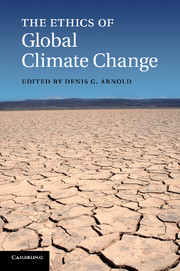Book contents
- Frontmatter
- Contents
- List of illustrations
- List of contributors
- Acknowledgements
- Introduction: climate change and ethics
- 1 Energy, ethics, and the transformation of nature
- 2 Is no one responsible for global environmental tragedy? Climate change as a challenge to our ethical concepts
- 3 Greenhouse gas emission and the domination of posterity
- 4 Climate change, energy rights, and equality
- 5 Common atmospheric ownership and equal emissions entitlements
- 6 A Lockean defense of grandfathering emission rights
- 7 Parenting the planet
- 8 Living ethically in a greenhouse
- 9 Beyond business as usual: alternative wedges to avoid catastrophic climate change and create sustainable societies
- 10 Addressing competitiveness in US climate policy
- 11 Reconciling justice and efficiency: integrating environmental justice into domestic cap-and-trade programs for controlling greenhouse gases
- 12 Ethical dimensions of adapting to climate change-imposed risks
- 13 Does nature matter? The place of the nonhuman in the ethics of climate change
- 14 Human rights, climate change, and the trillionth ton
- Select bibliography
- Index
- References
1 - Energy, ethics, and the transformation of nature
Published online by Cambridge University Press: 11 April 2011
- Frontmatter
- Contents
- List of illustrations
- List of contributors
- Acknowledgements
- Introduction: climate change and ethics
- 1 Energy, ethics, and the transformation of nature
- 2 Is no one responsible for global environmental tragedy? Climate change as a challenge to our ethical concepts
- 3 Greenhouse gas emission and the domination of posterity
- 4 Climate change, energy rights, and equality
- 5 Common atmospheric ownership and equal emissions entitlements
- 6 A Lockean defense of grandfathering emission rights
- 7 Parenting the planet
- 8 Living ethically in a greenhouse
- 9 Beyond business as usual: alternative wedges to avoid catastrophic climate change and create sustainable societies
- 10 Addressing competitiveness in US climate policy
- 11 Reconciling justice and efficiency: integrating environmental justice into domestic cap-and-trade programs for controlling greenhouse gases
- 12 Ethical dimensions of adapting to climate change-imposed risks
- 13 Does nature matter? The place of the nonhuman in the ethics of climate change
- 14 Human rights, climate change, and the trillionth ton
- Select bibliography
- Index
- References
Summary
Climate change is a complex problem that can be approached from many different perspectives: atmospheric science, global change biology, environmental economics, international law, environmental philosophy, and so on. It involves almost every sector of society from land use planning to forest management. One particularly productive way of framing the problem of climate change is as a problem of energy policy. This is the perspective that I will take in this paper. I begin with some brief remarks about the role of different energy sources in human history. I go on to claim that every currently available energy policy entails difficult trade-offs and that technology will not deliver us from the agony of choice, at least on the time-scale on which we must act to avoid “dangerous anthropogenic interference with the climate system.” I then bring these observations to bear explicitly on the problem of climate change and discuss their implications for policies that are now under active consideration. Finally, I draw some conclusions.
ENERGY'S HISTORY
Energy use has been central to the development of human civilization, society, and economy. As a first approximation, we can say that the story of human development has been the story of increased use of energy. Indeed, we can even think of human history as falling into epochs marked by the human ability to exploit various sources of energy.
- Type
- Chapter
- Information
- The Ethics of Global Climate Change , pp. 16 - 37Publisher: Cambridge University PressPrint publication year: 2011
References
- 33
- Cited by

